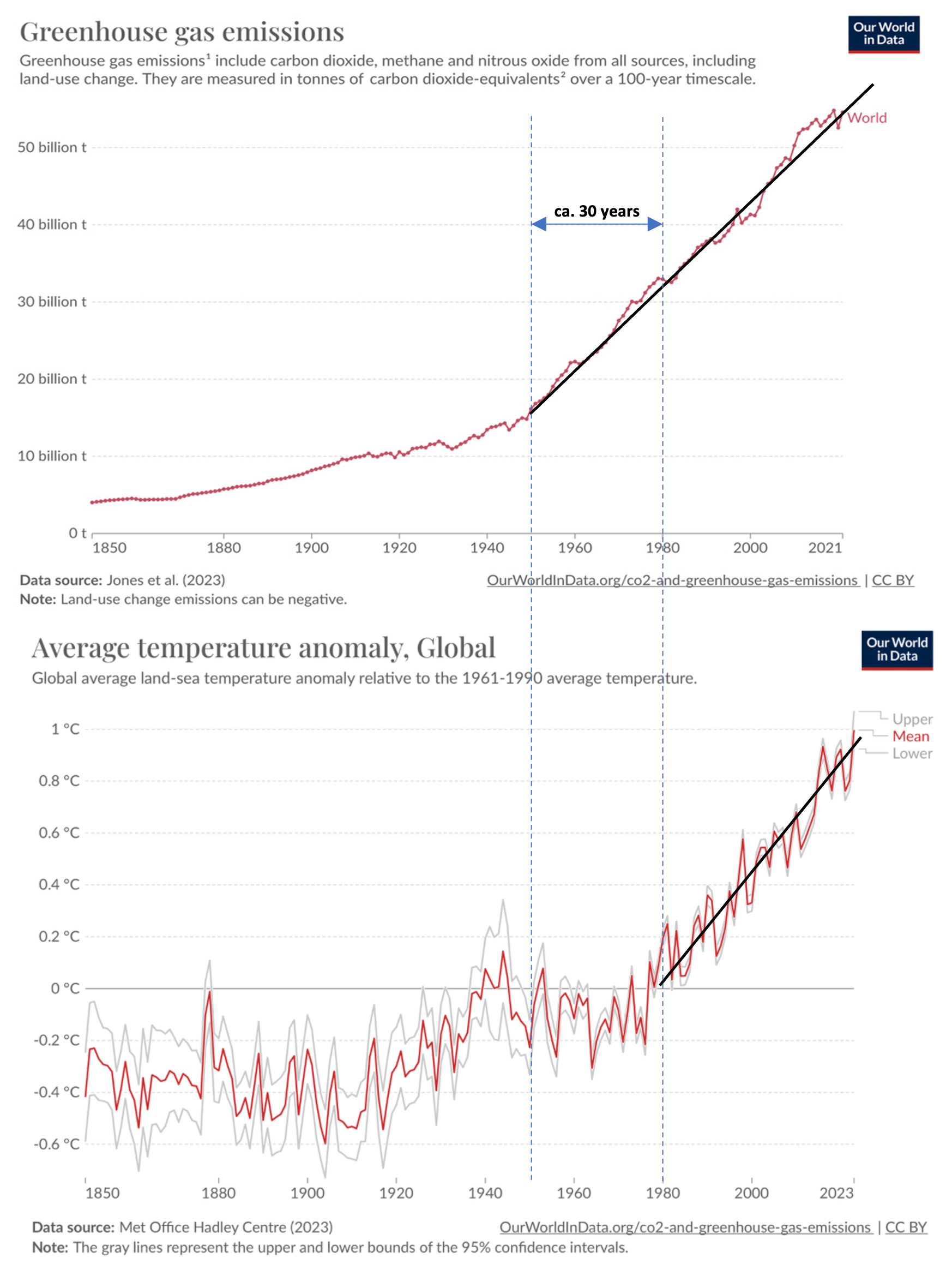The UN “Conference of the Parties” (COP) on Climate Change in 2024 will be the same formate as last COPs. We want this to be improved.
“COP 29 incoming Presidency are committed to ensuring a transparent and inclusive process in the lead-up to COP 29 to be convened in Baku, Azerbaijan, from 11 to 22 November 2024.”
https://unfccc.int/cop29
Since the beginning of UNFCCC and COPs in 1994, annual “greenhouse gas” (GHG) emissions are still rising and increased around 42% (from ca. 38 billion t p.a. in 1994 up to ca. 54 billion t p.a. in 2021) .
Global average temperature rise has reached ca. 1.4°C in 2023 (WMO, Copernicus, NOAA) and shows a time lag of ca. 30 years between the emission of the GHG and the actual temperature rise (“climate lag” see graph). GHG sinks like the ocean, the terrestrial surface (forests, plants and soil, mainly) and the atmosphere were able to delay the temperature rise.

Based on that, we already emitted enough GHG into the atmosphere of our planet Earth to have a global average temperature rise of at least 2.2°C till ca. 2050 (in comparison to the global average between 1850-1900 with a very optimistic linear projection). Since the GHG sinks seem to be full (e.g. ocean temperatures are rising), annual GHG emissions where not stable within the last 30 years (significantly increasing ca. 42%), the time lag between emitting the GHG and the temperature rise will shorten, and the temperature increase caused by the GHG emissions within the last 30 years will most likely impact global warming, climate change, and the loss of biodiversity significantly more than previous 30 years. We expect an exponential increase.
This means, climate “tipping points” (e.g. McKay et al.) will be reached, and unstoppable global warming self-reinforcing cycles activated (e.g. burning forests emitting additional GHG which leads to additional temperature rise and this leads to additional burning forests). Thus, global warming, climate change, and the loss of biodiversity is in our view already within the status of “partly out of human control”.
Furthermore,
(a) fossil fuel (coal, oil, gas) and meat producing corporations don’t show any/profound sings to actually get out of profit maximisation (selling as much coal, oil, gas & meat for the maximum price for as long as possible),
(b) Asia (mainly China and India), responsible for about 50% of overall GHG emissions world wide in 2021, most likely will further increase their GHG emissions within the upcoming years, and
(c) there is currently no global institution (grass-roots) democratically legitimised and with the legislation & execution power to actually mitigate/ban GHG emissions or bind GHG emissions to a global GHG emissions trading system.
Based on this understanding of global warming, climate change, and the loss of biodiversity, COP29 is primarily about the following two questions:
- How many people will loos their livelihood and become refugees till when?
- How many people will have to (directly or indirectly) die till when?
Since these are most severe questions effecting everyone on our planet Earth, we strongly recommend and we pledge for a (probably historic) global democratic vote on this matter. Every person is equally powerful, every person has one vote, not matter what wealth, what income, what race, what gender, what religion, what age, etc., and we want to add, no matter what nationality.
We pledge for a global direct democratic vote on climate actions
We have the scientific evidence, we have the global media coverage and we have the communication technology to organise a global, democratic and secure voting with at least about ca. 5.4 billion people (67% of the world’s population are using the internet in 2023, itu.int) with relative ease within months.
Strong leadership means to enable (grass-roots) democracy. A global vote will be aligned with the “Universal Declaration of Human Rights”, give a clear and strong direction on climate actions and will strengthen global and national democracy.
To actually carry out such a global vote on climate actions, we see the following 3 steps necessary to be carried out in advance:
(1) Science explains the consequences
Currently the majority of the people still think, their life isn’t impacted or threatened by global warming, climate change, and the loss of biodiversity. Science has to better explain what happens till when to the livelihood of several regions, give answer to the expected amount of refugees due to the loss of livelihood regions and the expected reduction of global population, including direct and indirect deaths due to global warming, climate change, and the loss of biodiversity.
We pledge for more inter- and transdisciplinary research to better understand the several scenarios and consequences.
(2) Media enables the people
Plural discussions are most important within democratic decision making. Nationalism is raising because democracy is not felt any more. People do understand that important topics are discussed within COP, they also understand that huge money (from them, the taxpayers) is mobilised. But they are not part of the discussion nor of the decision making.
It is not good enough to talk about e.g. see level rise or Polar Bears extinct. COVID-19 showed drastic reactions and changes are possible. The threat from COVID-19 was relative low in comparison to global warming, climate change, and the loss of biodiversity. But the threat was immanent noticeable, the dead people due to COVID-19 visible, (populistic) media could make drastic stories, and politicians (over-)reacted.
Global warming, climate change, and the loss of biodiversity is much more complex and thus much more dangerous because it is slow, and the system reacts inert. Without drastic action against GHG emissions we are heading into a widely deadly situation and a humanitarian catastrophe, the development will be dynamic and exponential in our view.
A global vote on climate actions will produce a broad and global discussion about this topic. Media has to support this with independent and critical journalism based on (non-commercialised) scientific insights to actually enable the people to build up their opinion and make a prudent voting possible.
(3) Politics involves & mobilises the people
We have the mass-voting technology. Democracy means, every person one vote, no matter what income, what religion, what gender, etc. Global (grass-roots) democracy will add to this no matter what nationality.
There are certainly several ways to develop global democracy. We plead for taking COP29 to initiate the way into global democracy:
- Develop clear action scenarios and tell the people (a) how many of them might loos their livelihood till when, (b) how many of them will have to die till when with the different climate action policies and scenarios (we certainly understand, this is very difficult and can only estimated).
- Different political parties can pledge for different climate action policies.
- People can decide with a profound understanding of the impacts on their lives within a direct and global vote on the scenario they want.
We ask politicians and leaders to have the courage to initiate global democracy with a (probably historic) global vote on climate actions.
